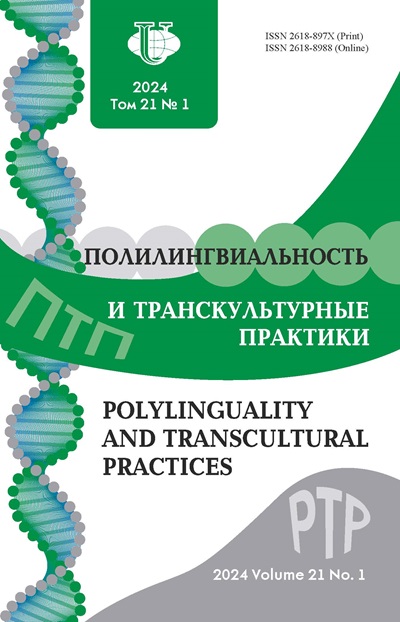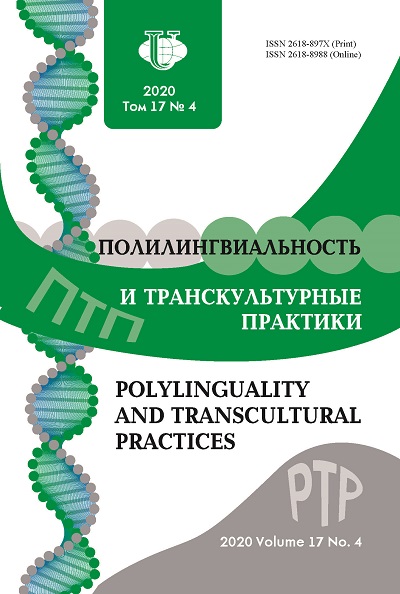Adapted Fiction in Teaching Russian to Foreign and Bilingual Students
- Authors: Afanasieva N.D.1, Zakharchenko S.S.1, Mogileva I.B.1
-
Affiliations:
- Moscow State Institute of International Relations (University) of the Ministry of Foreign Affairs of the Russian Federation
- Issue: Vol 17, No 4 (2020)
- Pages: 553-561
- Section: ARSENAL
- URL: https://journals.rudn.ru/polylinguality/article/view/25117
- DOI: https://doi.org/10.22363/2618-897X-2020-17-4-553-561
Cite item
Full Text
Abstract
The article is devoted to the problems of adaptation of literary texts, reading of which helps foreign and bilingual students to develop linguistic, speech, socio-cultural, and communicative competence at the Russian language lessons. The authors give examples of techniques and analyze methods of adaptation which were used by the teachers of the Russian language Department at MGIMO-University working with texts by A.Pushkin and M.Lermontov.
About the authors
Nina D. Afanasieva
Moscow State Institute of International Relations (University) of the Ministry of Foreign Affairs of the Russian Federation
Author for correspondence.
Email: afan-nina@yandex.ru
Candidate of Pedagogy, a Head of the Department of Russian Language
76, Vernadskiy Prospect, Moscow, 119454, Russian FederationSvetlana S. Zakharchenko
Moscow State Institute of International Relations (University) of the Ministry of Foreign Affairs of the Russian Federation
Email: sveta.zakharchenko@gmail.com
Candidate of Pedagogy, Associate Professor of the Department of Russian Language
76, Vernadskiy Prospect, Moscow, 119454, Russian FederationIrina B. Mogileva
Moscow State Institute of International Relations (University) of the Ministry of Foreign Affairs of the Russian Federation
Email: mogilevairina@yandex.ru
Candidate of Philology, Associate Professor of the Department of Russian Language
76, Vernadskiy Prospect, Moscow, 119454, Russian FederationReferences
- Russkij yazyk v nacional’noj shkole: Problemy lingvodidaktiki. 1977. Ed. by N.M. Shanskiy, N.Z. Bakeeva. Moscow: Pedagogika. Print. (In Russ.)
- Slesareva, I.P. 2010. Problemy opisaniya i prepodavaniya russkoj leksiki. Moscow: URSS. Print. (In Russ.)
- Pervuhina, S.V. 2014. “Vidy adaptacii teksta”. Vestnik Yuzhno-Ural’skogo gosudarstvennogo universiteta. Seriya: Lingvistika 11(1): 97—100. Print. (In Russ.)
- Kulibina, N.V. 2001. “Hudozhestvennyj tekst v lingvodidakticheskom osmyslenii”. Doctoral Thesis. Moscow. Print. (In Russ.)
- Potemkina, E.V. 2015. “Kommentirovannoe chtenie hudozhestvennogo teksta v inostrannoj auditorii kak metod formirovaniya bilingval’noj lichnosti”. Candidate Thesis in Pedagogical Sciences. Moscow. Print. (In Russ.)
- Ruzhickij, I.V., and E.V. Potyomkina. 2013. “Problema formirovaniya bilingval’noj lichnosti v lingvodidaktike”. Mir russkogo slova 2: 81—90. Print. (In Russ.)
- Rozental’, D.E., and M.A. Telenkova. 1972. Spravochnik lingvisticheskih terminov: posobie dlya uchitelya. Moscow: Prosveschenie. Print. (In Russ.)
- Kulibina, N.V. 2013. “Adaptirovat’ nel’zya ponyat”. Russkij yazyk za rubezhom 5: 23. Print. (In Russ.)
- Formirovanie i ocenka kommunikativnoj kompetencii bilingvov v processe dvuyazychnogo obrazovaniya. 2012. Ed. by Yurkov E.E. SPb. Print. (In Russ.)
- Strel’chuk, E.N. 2011. “Rol’ hudozhestvennoj literatury v formirovanii i razvitii russkoj rechevoj kul’tury inostrannyh studentov”. Izvestiya Samarskogo nauchnogo centra Rossijskoj akademii nauk 2 (5): 1135—1139. Print. (In Russ.)
- Afanas’eva, N.D., A.V. Burobin, and Zaharchenko S.S. 2015. Chitaem Pushkina vmeste («Povesti Belkina»): ucheb. posobie dlya studentov-inostrancev po obucheniyu russkomu yazyku. Moscow: MGIMO–Universitet. Print. (In Russ.)
- Afanas’eva, N.D., and A.V. Burobin. 2019. Podgotovka teksta i zadanij. Lermontov M.Yu. Knyazhna Meri. SPb.: Zlatoust. Print. (In Russ.)















